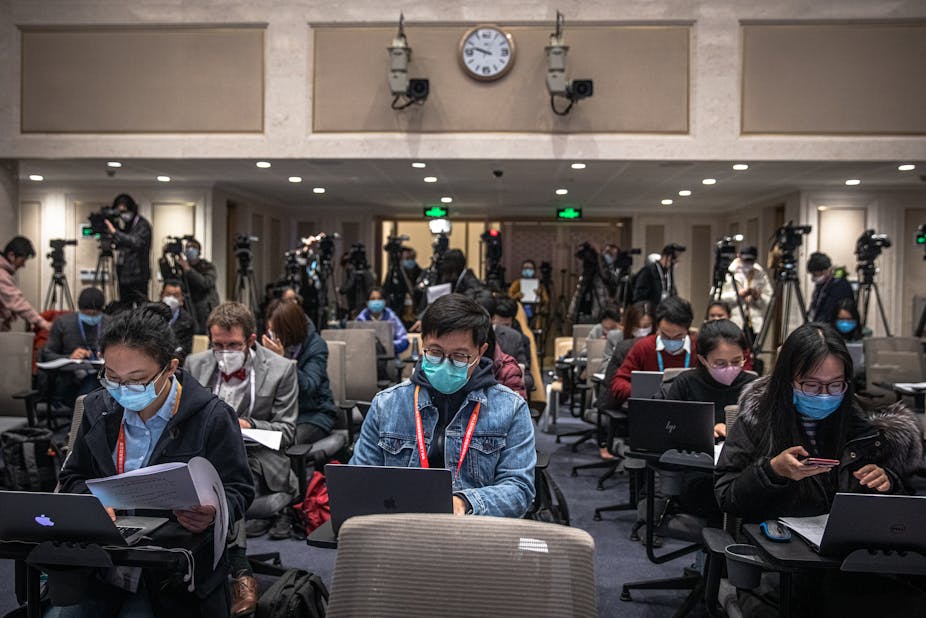As the world wages a difficult battle with the coronavirus pandemic, China is escalating its own diplomatic war with the US – and the media is the casualty.
On March 18, China announced it would expel at least 13 American journalists working with three leading US newspapers: The New York Times, The Wall Street Journal and The Washington Post.
China’s Ministry of Foreign Affairs told the journalists to hand back their press cards within ten days. “They will not be allowed to continue working as journalists in the People’s Republic of China, including its Hong Kong and Macao Special Administrative Regions,” the announcement read.
In its announcement, the government said the expulsions had been made “in the spirit of reciprocity” in response to a US move in late February to designate five Chinese state media agencies operating in the US as “foreign missions”. This imposed a cap on the size of their reporting teams in the country. That same week, China had expelled three other reporters from The Wall Street Journal over the controversial title of an opinion piece the paper published which referred to China as “the real sick man of Asia”.
The most recent expulsions came a week after the Chinese president, Xi Jinping, made his first visit since the outbreak to Wuhan, the epicentre of the pandemic, signifying China’s propaganda effort to frame the narrative as a victory in containing the virus.
A few days later, a Chinese Foreign Ministry spokesman tweeted a conspiracy theory blaming the US for the outbreak, which was met by a rogue tweet from the US president, Donald Trump, calling coronavirus the “Chinese virus”.
While unprecedented in scale and scope, the expulsion of the 13 journalists is just the latest example of the press being attacked amid the escalating tensions between China and the US.
A tight leash
China is known for its stringent control over the press, both domestic and foreign. In my book on foreign reporting in China, I detailed how the strong tradition of a media system controlled by the Chinese Communist Party, in which journalism is used as the party’s mouthpiece and to emphasise positive stories, has long been on rocky ground with the foreign press. This is particularly the case with the Western press, who are steeped in liberal media traditions in which public service journalism, an independent media, and professionalism are highly valued.
One of the ways the Chinese government keeps the foreign press corps on a leash is to impose a strict accreditation system, under which foreign journalists need to apply for a press card and a “journalist visa”. Both are reviewed and renewed every year. With this system China can expel journalists deemed not friendly enough. This happened to the Wall Street Journal reporter Chun Han Wong in 2019, as well as Ursula Gauthier a reporter for French weekly magazine L’Obs, in 2015 and Al Jazeera journalist Melissa Chan in 2012.
But such a large expulsion of 13 journalists with a clear message of retaliation against another superpower has never been seen before. The ban also covers Hong Kong, the Asian hub for most international news outlets. The semi-autonomous territory, which has its own legal and media system, has been hit by waves of protests and violence in recent months amid defiance at Chinese influence on its governance.
Read more: Hong Kong: police legitimacy draining away amid spiral of rage and retaliation
The move clearly mirrors Xi’s strong-handed governance and diplomatic style. Since coming to power in 2012, he has noticeably tightened the state’s grip over media and civil society at home, and has abandoned the “hide and bide” diplomacy strategy of former Chinese leader Deng Xiaoping in favour of an assertive, and increasingly belligerent one.

Awful timing
The fast deterioration of the world’s most important bilateral relationship has come at the worst possible time. The world urgently needs a joint effort to cope with the unprecedented crisis caused by coronavirus. An independent press is vital to hold power to account and ensure the public are well informed.
Both China and the world are now suffering from China’s lack of transparency. When Dr Li Wenliang, a 34-year-old Chinese ophthalmologist died from contracting coronavirus in early February, he was hailed as a hero amid calls on social media for freedom of speech. Just a month before his death, Dr Li had been reprimanded by local authorities for “rumour-mongering” after trying to alert the public about the outbreak.
Read more: China’s coronavirus cover-up: how censorship and propaganda obstructed the truth
With public opinion and information rigidly policed, anything disliked by the authorities could be labelled as “rumour” in China – and anyone who speaks truths inconsistent with the official narrative could be penalised for “rumour-mongering”. This begs the question of the credibility of the official narrative, which does not welcome scrutiny or challenging.
China’s increasing efforts in muzzling its own press gives the foreign press an even more important role. So much so that internet users in China half-jokingly share a saying: “Learn English language to better understand China” (xue hao ying yu, liao jie zhong guo).
It was the American news magazine, Time, which first broke the story of the SARS outbreak 17 years ago. Chinese doctor Jiang Yanyong, a brave whistleblower who spoke out about China’s cover-up of the outbreak, failed to get the message out in the Chinese media. The world remained ignorant until Susan Jakes, then China correspondent of Time, picked up the story. Now Time – together with the three US newspapers and Voice of America – have been designated by China as “foreign missions”, subject to more stringent control.
“A healthy society shouldn’t have just one voice.” That is the legacy Dr Li left behind. By expelling the 13 American journalists, China is moving once against to eradicate voices outside of its official narrative just when they are most needed.

